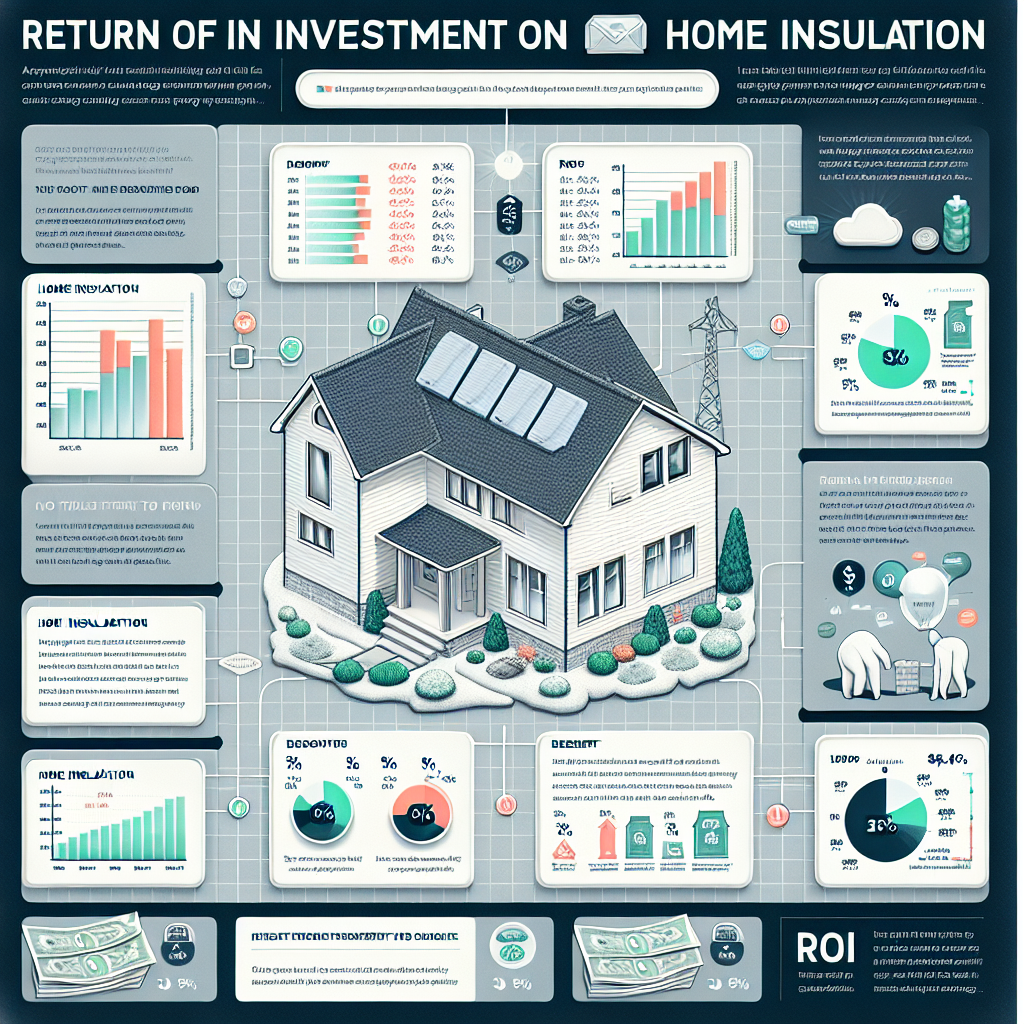Home Insulation ROI (Return on Investment)
-
Table of Contents
Home insulation ROI (Return on Investment) is a critical metric for homeowners considering energy efficiency upgrades. It measures the financial benefits gained from insulating a home compared to the initial investment cost. Effective insulation reduces energy consumption by maintaining consistent indoor temperatures, leading to lower heating and cooling expenses. Over time, these savings can offset the upfront costs of insulation materials and installation. Additionally, improved insulation can enhance property value and contribute to environmental sustainability by reducing carbon footprints. Understanding the ROI of home insulation helps homeowners make informed decisions about energy efficiency improvements, balancing cost with long-term financial and environmental benefits.
Maximizing Energy Savings: The ROI of Home Insulation
Home insulation is a critical component in the quest for energy efficiency and cost savings. As homeowners increasingly seek ways to reduce their energy consumption and lower utility bills, understanding the return on investment (ROI) of home insulation becomes paramount. The concept of ROI in this context refers to the financial benefits gained from the initial expenditure on insulation materials and installation. By examining the various factors that influence the ROI of home insulation, homeowners can make informed decisions that maximize their energy savings.
To begin with, the type of insulation material used plays a significant role in determining the ROI. Common insulation materials include fiberglass, cellulose, and spray foam, each with its own set of advantages and cost implications. Fiberglass insulation, for instance, is relatively inexpensive and easy to install, making it a popular choice for many homeowners. However, spray foam insulation, while more costly upfront, offers superior thermal resistance and air sealing properties, which can lead to greater long-term energy savings. Consequently, the initial investment in higher-quality insulation materials can yield a higher ROI over time.
Moreover, the effectiveness of home insulation is heavily influenced by the quality of installation. Proper installation ensures that there are no gaps or voids that could compromise the insulation’s performance. Poorly installed insulation can lead to thermal bridging, where heat escapes through uninsulated areas, thereby reducing the overall energy efficiency of the home. Therefore, hiring a professional contractor with expertise in insulation installation can significantly enhance the ROI by ensuring optimal performance and energy savings.
In addition to material and installation quality, the location of the insulation within the home also impacts the ROI. Insulating key areas such as the attic, walls, and floors can prevent heat loss and improve the home’s overall thermal envelope. The attic, in particular, is a critical area for insulation, as it is often the primary source of heat loss in a home. By investing in high-quality attic insulation, homeowners can achieve substantial energy savings, which translates to a higher ROI.
Furthermore, the climate in which the home is located plays a crucial role in determining the ROI of insulation. In colder climates, where heating costs are a significant portion of the household budget, effective insulation can lead to considerable savings on energy bills. Conversely, in warmer climates, insulation helps maintain a cooler indoor environment, reducing the need for air conditioning and lowering energy costs. Thus, the ROI of home insulation is closely tied to the specific energy demands of the region.
Another important factor to consider is the potential for government incentives and rebates. Many governments and utility companies offer financial incentives to encourage homeowners to invest in energy-efficient upgrades, including insulation. These incentives can offset the initial cost of insulation, thereby improving the ROI. Homeowners should research available programs and take advantage of any applicable rebates to maximize their investment.
Lastly, the long-term benefits of home insulation extend beyond immediate energy savings. Improved insulation can enhance indoor comfort, reduce noise pollution, and increase the overall value of the property. These additional benefits contribute to the overall ROI by providing a more comfortable and desirable living environment.
In conclusion, the ROI of home insulation is influenced by various factors, including the type of insulation material, quality of installation, location within the home, climate, and available incentives. By carefully considering these factors and making informed decisions, homeowners can maximize their energy savings and achieve a higher return on their investment in home insulation.
Long-Term Financial Benefits of Upgrading Home Insulation

Upgrading home insulation is often viewed as a significant investment, but the long-term financial benefits can be substantial. Homeowners who choose to enhance their insulation are not only making a decision that impacts their immediate comfort but also one that yields considerable financial returns over time. The concept of Return on Investment (ROI) is crucial in understanding these benefits, as it provides a clear picture of the value derived from the initial expenditure.
One of the primary financial advantages of improved home insulation is the reduction in energy costs. Insulation acts as a barrier to heat flow, ensuring that a home remains warmer in the winter and cooler in the summer. Consequently, this reduces the need for heating and cooling systems to work overtime, leading to lower energy consumption. Over the years, the savings on utility bills can accumulate significantly, often offsetting the initial cost of the insulation upgrade. For instance, studies have shown that homeowners can save up to 15% on heating and cooling expenses annually, which translates to substantial savings over the lifespan of the insulation.
Moreover, the financial benefits extend beyond mere energy savings. Enhanced insulation can also increase the overall value of a property. In today’s real estate market, energy efficiency is a highly sought-after feature. Potential buyers are increasingly aware of the long-term cost savings associated with well-insulated homes, making such properties more attractive. As a result, homes with upgraded insulation often command higher selling prices, providing homeowners with a favorable ROI when they decide to sell.
Additionally, there are often tax incentives and rebates available for homeowners who invest in energy-efficient upgrades, including insulation. These financial incentives can further reduce the net cost of the insulation project, thereby improving the overall ROI. Governments and utility companies frequently offer these programs to encourage energy conservation, recognizing the broader environmental benefits of reduced energy consumption.
Furthermore, improved insulation contributes to the longevity and durability of a home. By maintaining a more consistent indoor temperature, insulation helps to prevent the expansion and contraction of building materials, which can lead to structural damage over time. This not only preserves the integrity of the home but also reduces maintenance and repair costs. In the long run, the reduced need for repairs and the extended lifespan of the home’s components contribute to a more favorable financial outlook.
It is also worth noting that the comfort and health benefits associated with better insulation can indirectly contribute to financial savings. A well-insulated home provides a more stable and comfortable living environment, reducing the likelihood of health issues related to extreme temperatures and poor air quality. This can lead to fewer medical expenses and improved overall well-being, which, while not directly quantifiable, certainly adds to the overall value proposition of upgrading home insulation.
In conclusion, the long-term financial benefits of upgrading home insulation are multifaceted and compelling. From significant energy savings and increased property value to tax incentives and reduced maintenance costs, the ROI on insulation improvements is robust. Homeowners who invest in better insulation are making a prudent financial decision that pays dividends over time, enhancing both their immediate living conditions and their long-term financial health.
How Home Insulation Enhances Property Value and ROI
Home insulation is a critical component in the construction and maintenance of residential properties, offering a multitude of benefits that extend beyond mere temperature regulation. One of the most compelling reasons to invest in home insulation is its potential to enhance property value and deliver a substantial return on investment (ROI). Understanding how home insulation contributes to these financial advantages requires a comprehensive examination of its various impacts on a property.
To begin with, home insulation significantly improves energy efficiency. By reducing the amount of heat that escapes during the winter and limiting the influx of heat during the summer, insulation minimizes the need for constant heating and cooling. This reduction in energy consumption translates directly into lower utility bills, providing immediate financial relief to homeowners. Over time, these savings accumulate, effectively offsetting the initial cost of insulation installation. Consequently, prospective buyers often view well-insulated homes as more attractive due to the promise of reduced ongoing expenses, thereby increasing the property’s market value.
Moreover, the enhanced comfort provided by effective insulation cannot be overstated. A well-insulated home maintains a more consistent indoor temperature, eliminating cold drafts and hot spots. This level of comfort is a significant selling point, as it directly impacts the quality of life for occupants. Potential buyers are likely to place a premium on properties that offer such comfort, further driving up the market value. Additionally, insulation contributes to a quieter indoor environment by dampening external noise, which is particularly beneficial in urban areas or near busy roads. This added tranquility is another factor that can make a property more appealing to buyers.
In addition to immediate financial benefits and improved comfort, home insulation also plays a crucial role in long-term property maintenance. Proper insulation helps prevent moisture buildup, which can lead to mold growth and structural damage over time. By safeguarding against these issues, insulation extends the lifespan of various building components, reducing the need for costly repairs and maintenance. This aspect of insulation is particularly attractive to potential buyers who are looking for properties that promise lower long-term upkeep costs.
Furthermore, the environmental benefits of home insulation are increasingly becoming a consideration for property buyers. As awareness of climate change and environmental sustainability grows, more buyers are seeking homes that align with their eco-friendly values. Insulated homes typically have a smaller carbon footprint due to their reduced energy consumption. This environmental advantage can enhance the marketability of a property, appealing to a broader range of environmentally conscious buyers and potentially commanding higher prices.
It is also worth noting that various government incentives and rebates are available for homeowners who invest in energy-efficient upgrades, including insulation. These financial incentives can further improve the ROI of insulation projects by reducing the initial outlay required. Homeowners who take advantage of these programs can recoup their investment more quickly, making insulation an even more attractive proposition.
In conclusion, home insulation offers a multifaceted array of benefits that collectively enhance property value and deliver a robust return on investment. From immediate energy savings and improved comfort to long-term maintenance advantages and environmental benefits, insulation is a wise investment for any homeowner. As the market increasingly values energy efficiency and sustainability, the importance of proper insulation will only continue to grow, making it a critical consideration for those looking to maximize their property’s value and appeal.
Read more about Home Insulation
- Types of Home Insulation
- Benefits of Home Insulation
- Choosing the Right Insulation for Your Home
- Common DIY Home Insulation Mistakes
- Insulation for Different Areas of Your Home
- Signs of Poor Home Insulation
- Home Insulation ROI (Return on Investment)
- How to Improve Home Insulation without Breaking the Bank
- Upgrading Home Insulation for Extreme Climates
- Maintaining and Updating Home Insulation








